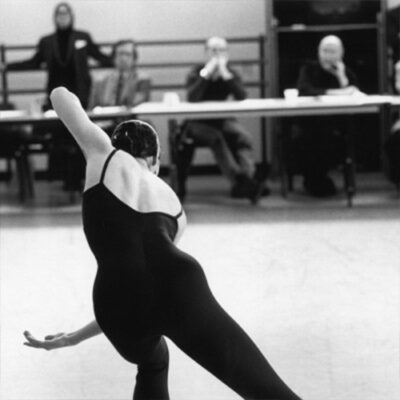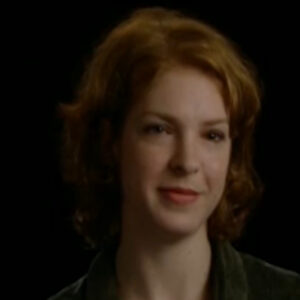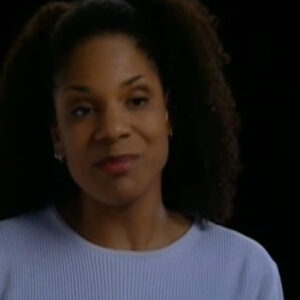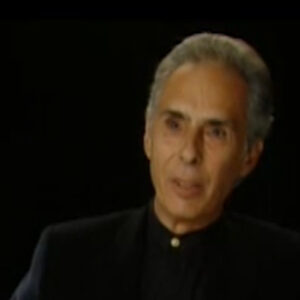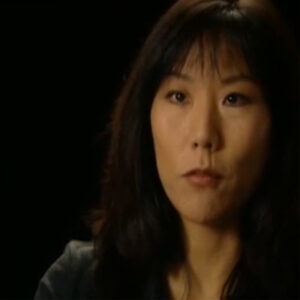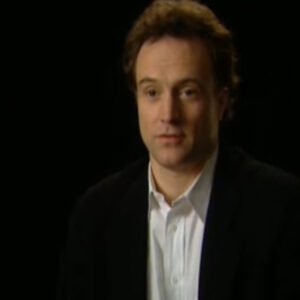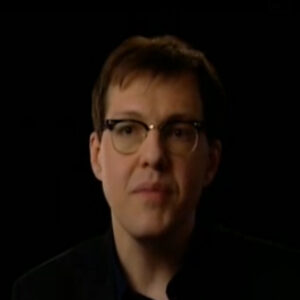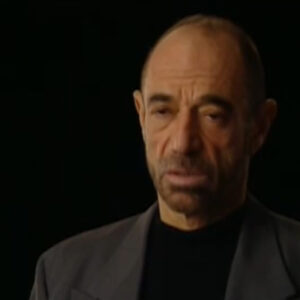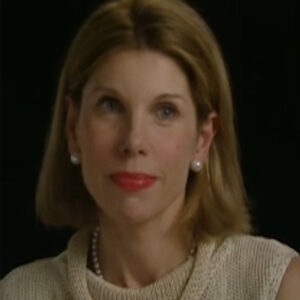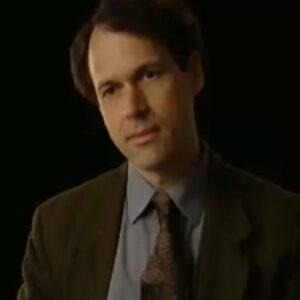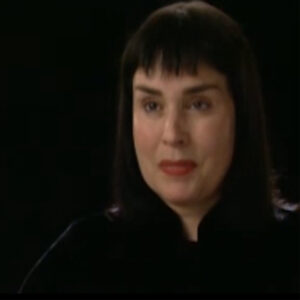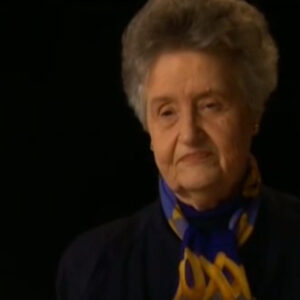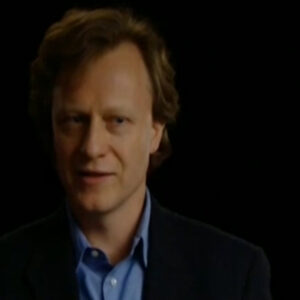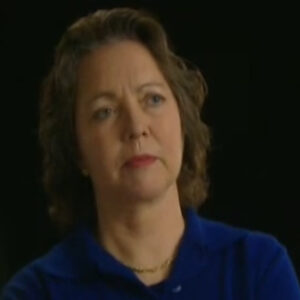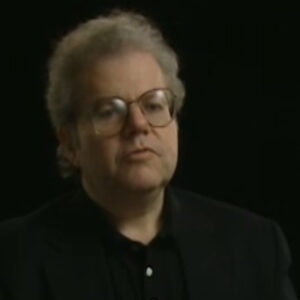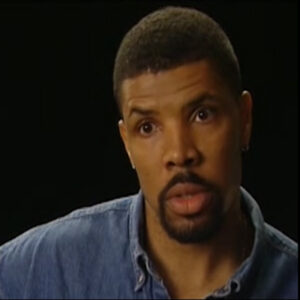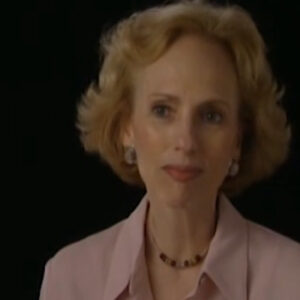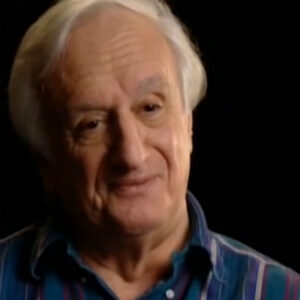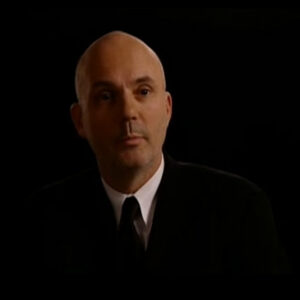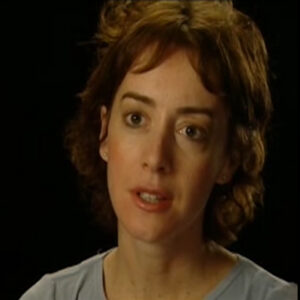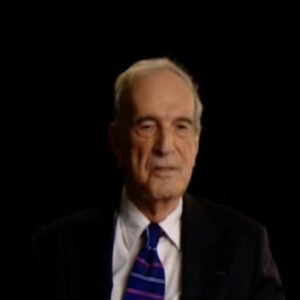Speaker Well, first of all, Juilliard, I think, is is the famous conservatory in this country. I mean, it’s the pinnacle in terms of conservatory. I mean, I’ve gone to some fantastic, fantastic schools. But what I’ve noticed when I’m in Europe, everyone knows the name Juilliard and they don’t necessarily know all of the other terrific places. So my specific situation is that after doing my master’s degree, the Eastman School of Music, I went to Aspen Music Festival and I was shopping. I knew I had to move to New York and I was shopping for a voice teacher. And I found Beverly Johnson out there and. And George Mester was actually conducting. I’m to I’m thinking was The Rake’s Progress. It may have been Geovani that we did, but I received a phone call that summer was going to move to New York and just work with Beverly, received a phone call from Erica Castelli, who said who was a fantastic champion for me. For a lot of years in ways that I wasn’t even aware of, which I found out recently. And she she said. Ms. Fleming, we’d like to invite you to the Juilliard School to sing. At the level M.. And I got completely lost and I was running around the house screaming like a maniac, jumping up and down. She wasn’t particularly amused. So I was humiliated, but I was so excited to be accepted to the school. And I have to say truthfully, that year that my first year at Juilliard was one of the most exciting, most fantastic years of my life because I everything was full of possibility. I had enormous energy. I moved to New York with my dog. I was working several jobs while having this fantastic instruction, being in an opera. I mean, it was the most amazing thing. And I was there for two and a half years. And I had I had really an enormous amount of training at Juilliard, which is I’m still using I’m still working with the same people and a number of years later and still really counting on all of that that I learned in the school.
Speaker And what was at the core of what you were doing there? What happened when you got there? What what what kind of technique or classes or things were you getting that were what were you doing and what what was new to you? How is it how is it propelling you forward?
Speaker Well, I mean, really the most important aspect to any instruction for a singer, the really the cornerstone and the and the entire basis for a pyramid of instruction is is a voice instruction is is really garran garnering a singing technique. And that’s that was what I would says the most important single, most important element for any young singer. And obviously I had that and Beverly and I still continue to work with her. At the same time, I was learning skills, being involved in the Sahba. It was a it was a very professional production. It was it was a beautiful production. So and there were there were two casts. The other cast was really made up. I was a student. The other cast was really made up of fully professional singers, people who were working at the regional level already. So it was an opportunity for me to observe how they worked, what they how they sang. I learned a lot. I mean, had the other we were double cast. The other Mazeppa really took me under her wing and taught me lots of really fantastic information, like how to wear two shades of lipstick and things that are, of course, a performing artist has to have.
Speaker So it was it was all of it was new. The the level of language instruction that I say that is the second most important element. And the second most important gift that I received from Juilliard was the fantastic diction coaches and also in regular language instruction. But I still work regularly with Tom Groberg when I have a chance with Quotidien, a couple of our Catherine LeBoeuf. And in fact, I did a recording for Decca in December and asked specifically for Codina that she would be on the project and she was phenomenal. So this is, in other words, the level of instruction and amongst these people is this is as high as it gets in the entire professional world as well. It’s an extremely high level. And that and naturally one can’t also dispelled the fact that I had the opportunity to perform in New York City, which was an important launching pad. I mean, I did an opera with a John Carlo Minardi opera with and he directed it. So that was a tremendous opportunity also. So this is this is an extraordinary it’s to have a conservatory with this quality in a city like this. It’s a really the the the double exposure.
Speaker And we’re I’m trying to think in a year that you were there, what, what, what what was your first year there was like said. Were you there like six seventy three or. What year were you there? I was there in eighty four. Eighty four. Right. God.
Speaker Like I was listening to the Dallas.
Speaker I can do what I would have been because I’m trying to think what you, what the feeling was, you know, sitting there is am totally wrong. But I’m not being.
Speaker Lincoln Center. What that kind of brought to it, knowing I am across the plaza. Oh yeah.
Speaker Or or or promise of the read for really no fantasy. You know, it was it’s really walking by those arches at the Met and City Opera and thinking, someday, someday, you know. And it took a couple of years. I won. When I won the Mac competition. It was that that’s really the other fantastic thing is, of course, that I went to a standing room with the men all the time. So you were practicing one thing during the day and watching it.
Speaker Really? The finished product at night. So that was it. That was that’s, of course, a really fantastic opportunity.
Speaker I think that sometimes some people have thought of it as being sort of sort of daunting because, you know, it isn’t even though Lincoln Center, even though Julia is a conservative school, it’s not it’s not necessarily a free ride.
Speaker I mean, you’ve really got the sense of competition when people get to the school market. I think you’re just not your market, isn’t it? Thank you. We just need a little tiny little bit.
Speaker If you want to bring my bag. Thank you. Thank you.
Speaker You know, the thing that was actually kind of great about it? Well, we learned about rather way that he needs to find that thing that punches him up.
Speaker Because, you know, he actually came in like many comics, quite, you know.
Speaker Yeah. And then he waits to beat him. Yeah. But then he goes off. Yes, I believe it. That’s fabulous.
Speaker But one thing I wanted to talk about, particularly because we’re following a young, young soprano, adorable girl.
Speaker And we’ve been in a lot of lessons that everybody’s holding her face. I mean, it’s so hands on. What is going on in those? I mean, did you experience your lesson to be like that to me? Have you thought of an audience looking at that? I mean, what are they seeing? What is this incredibly well? Is that learning how to sing?
Speaker It’s I mean, I think it’s the most difficult thing. I mean, I think it’s a wonder that anybody can figure it out. And the reason why is because the muscles that produce a singing voice are almost all involuntary muscles. So, you know, it’s through imagery and through, you know, hopefully an understanding of physiology. But through all kinds of of indirect means that we make our bodies do this crazy thing for three hours at a time and which is really the equivalent of screaming. But it’s just doing it in such a way that, you know, it’s it’s very trained at this point. But some teachers are very hands on. Some people never touch you. Some people demonstrate all the time. Some people never sing a note. You know, for every student, there’s a different way of teaching. There’s no unlike many situations because our bodies are all different and therefore the each instruments fully different. It takes it takes an enormous amount of imagination on the part of the teacher to be able to allow the student to come to some sort of of healthy way of singing and a lot of different ways. It’s very intangible.
Speaker But when people talk about technique, this elusive technique developed a lot of technique while you actually you literally meaning I could not lift myself palette.
Speaker I can now. That is that what technique is what is doing is the elusive art of absolute.
Speaker It’s everything. It’s learning a breathing technique. I mean, the basis of singing is really on the breath. It’s about how you use your breath. It’s learning how to support. We can’t sing these long, sustained things where, you know, you realize we’re the last singers in the Western world to perform unamplified. There are no other singers now who perform without a microphone, except I’m not even in coffeehouses with 15 people. They still have a microphone, not even on the street anymore. So it’s a very specialized pursuit and it requires a balancing. I always say you really I can describe one can describe how singing in five minutes and it takes 15 years to do it well, because it takes a long time to coordinate and balance all of the various muscles that are involved to have tension in the right places, to have to be relaxed in the right places. Then you have to learn the languages. You have to learn the artistry. You have to be a musician, you know. And I think it’s just it’s just such an and it requires an enormous amount of coordination on the part of the mind and the body at you know, if there’s placement, people talk about placement, singing the mask. It’s about where do you how do you direct your voice? Where’s the resonance? Is a resonance. Is is a chest, is it mixture? Is it in your mouth? Is it up higher as you know in your. Ah, it’s just it, it’s, it’s, there’s so many variables involved in coordinating the body to do this well. And you know what teachers love to say and it’s true. You’ll understand when you can do it or or when you can do it. It’ll be really easy and fun. And until then it can be enormously, enormously frustrating. There’s so much talent. There’s so many more voices out there than I have singing careers because so few people actually can put it all together. And there are also a few lucky ones who kind of come on the scene. And they’ve they it’s always been there for them.
Speaker Speaking of that, I mean, do you think you know, we’ve been talking to a lot of instrumentalists who say, you know, everybody holds onto those orchestra seats like a, you know, for 50 years and, you know, now what? What do you think the music scene is? If you’re if you’re coming out of Juilliard, you think the odds are just terribly difficult. Is it luck versus talent versus ambition?
Speaker Yeah. What? How different is the world in the world that you came to?
Speaker Well, I don’t know what it’s like today, to be honest. I have noticed recently a real.
Speaker Intense interest in this in opera from students everywhere, they.
Speaker Every city that I go in there, I find many, many more singers, young singers coming backstage. And it could be that they were always there. They just did know who I was. So now they’re coming back to say hello. Or it could be that there are more people interested. It’s hard to say. I mean, I find it very heartening, for instance, that the mass media has really jumped on the bandwagon. There’s a lot of interesting commercials and in film and in in classical music and in opera. And there’s also a terrific spirit of collaboration now between artists who are who are more who are have a mass appeal and a mass popularity. And I mean, you know, certainly pop singers have stolen the word diva from us for for the moment. So so it’s kind of things are very open in. Their lines are disappearing right now. They’ll be very interesting to see what happens with that in the future. But whether things how difficult things are right now, I don’t know. They were certainly difficult for me. It took me a while. I had a very tough transitional period between being a student and being a professional. I mean, that was definitely the hardest part. Juilliard got me through that to a very great extent because it was as though it was those couple of years that I was in the in the. What was there then? The American Opera Center that really enabled me to continue to work to support myself in other ways, but to to be able to afford to continue having instruction to to be able to be in a couple of productions, to be seen by people. I got management through my connection at Juilliard. All of these things that are extraordinarily difficult. And then eventually it was later that I won competitions and that the career really took off.
Speaker And when you first got to Juilliard, did you feel, you know, I been saying, I know what you said, you sort of got there. Many people do. You went through this kind of high watermark and you look to your left and you look to your right. Oh, we’ve had a lot of people say, you know, that first minute when they get there, they come from somewhere.
Speaker They think the big fish. That’s right. How did you experience that? Yeah, I kind of expected that. I didn’t mind.
Speaker But, you know, it was all connected to those that that couple of that frustrating period of growth. And I would say one of the most important qualities that one needs, and it certainly served me as resilience, is that ability to constantly bounce back, to take the hit, to have the frustration, to not get the part, to not get the audition. More recently, to get the bad review, to get the you know, to have things not go exactly the way you want them to go and to come back and to come back again and again and again. So that’s a very important quality to have. But I can completely I was certainly under an undergraduate school at the State University of New York at Potsdam. I was certainly a big fish in a small pond, which was extremely useful. I mean, in truth, I came to Juilliard as a graduate student and really in postgraduate work. So I. I have to say, I would think it would be much harder for freshmen to arrive at Juilliard and say, gosh, how do I get from here to there?
Speaker Did you find the sort of the conservatory of the competition or the stress or the hard working teachers or the nine to nine at night? You know, to be kind of true. I mean, did you feel like you worked like a dog while you were there? I mean, absolutely.
Speaker Yeah. But, I mean, I was also working at a law firm in between. So, yeah, I worked like a dog all year. But I loved it. I didn’t mind. I had enormous energy. And I had I was just so full of hope. I really didn’t mind because and also I was I was fortunate and that even at Juilliard, because I had been brought in to do a specific role and it was La Belle WAMM, which has been the most famous opera of all time, the most known offer of all time. It was really in ideal circumstances, not as if I came in again as an undergraduate and was trying to find my place.
Speaker Talk about this chomper. I think he’s I’m the one.
Speaker The chopper, he’s looking to see who’s in the presidential suite with the windows drawn curtains.
Speaker Talk about the about you if you have thoughts about sort of contrastive of to school actually thinking that you’re seeking fame versus really realize that something has to be a journey void of results.
Speaker Because I think something I come away from a school with is really it’s all a process of joy.
Speaker That’s how the art has such meaning for you, that you kind of erase the results.
Speaker Well, I think I think because we are striving to be performers. The two go hand in hand. On the one hand is the is is the the striving for success. And it’s very real success means you work. If it means that you you get paid for performing. You have an audience, you have an audience who appreciates you that, you know, if you if you wanted to do it for other reasons, then you wouldn’t be striving to be a performer. You would be striving to excel in your instrument and do it in your living room for yourself. So one can’t completely ignore that ever.
Speaker I don’t think you know, because there’s very much we as as certainly a singers on the operatic stage, I don’t know a single singer who isn’t doesn’t live for applause, who doesn’t live for, you know, for for the validation that an audience that brings is certainly a part of it. And we can’t deny that. But the other part of it is the process. And I have to say, I’ve always been very drawn to the process. I was always more steeped in the process.
Speaker I loved from very early on to be alone in a practice room. I did not enjoy performing and I had to because performing was so stressful for me and so terrifying. So I had to. That was one part of what I had to learn at Juilliard. I remember him being in a master class at Juilliard and just breaking down in tears because I just thought, I can’t do this. I can’t be comfortable in this. And, you know, this was this was really kind of those were formative years for me and trying to come to terms with what it meant to lose all the negative critics and the judges and the and the voices on the shoulder saying you’re not good enough. You can’t you know, you don’t do this well enough, the negative, really negative voices and learn to be on my own. I always used these were cheerleader and in a way didn’t learn to develop a voice. It says, rah, rah, you can do it. And nobody is sitting out there wanting you to fail. So this was I had to do a lot of kind of mental attitudinal work while I was in those years. And I think that’s besides the technical work, those two things were the key accomplishments that enabled me to go on and have a professional life. But the process I always loved, I loved sitting in the room and thinking about singing and trying different things and experimenting and, you know, because it’s not enough, really, you have to have input from your teachers, but you also have to have curiosity if you’re going to conquer these totally intangible problems that are going on in the inside of your body and in your throat that you have no control over, you have to have a lot of curiosity about that. So I’ve always enjoyed that very much.
Speaker Can we just hold on one second, get some room, I’ll just take quietly.
Speaker But this is room tone 30, room 30, 02 two with chopper hovering outside.
Speaker And room tone, which up around, I just want to get the figures out. You. I’ll be adding everything. Yes. The sun is coming back to pick me up. I’ll be on the roof in a minute.
Speaker But, yeah, I mean, there’s there’s two things that you’re talking about. One. I mean, I’m. What is stage fright? And one is is sort of, you know, the self-loathing element. And we are actors in a constant state of questioning.
Speaker Oh, yeah. Oh, I am now. And then there’s casting off the school year.
Speaker I mean, how how are those two things? I mean, it’s stage fright. It’s a bit of a different thing.
Speaker It is different. No, it is different, but they’re very much interrelated, obviously. If you think you’re going to be judged harshly by whoever it is you’re performing for, then you’re not going to particularly be thrilled about going out. So for me, it was much more about finding the positive voices and finding that the nurturing voices within myself than it was about conquering a actual stage fright. It was really it was about finding an environment in which I could grow and learn and be comfortable with not being perfect. I remember Jan Guy Tony, I worked with her in chief and she came and worked with me at the school once. And she said, your goal is to really perform within a 10 percent range. It’s not your goal is not perfection. And I was so relieved when she said that it was an enormous relief. So some of these obvious things, I think I think the school now probably has many programs which address these issues much more openly and that they hadn’t started yet. Really, when I was there, they they had just started bringing in even professional counselling. There was none of that when I was in school. They just started it sort of at around that period of time, bringing in people from age managers. And people like Mary Lou Falcone coming in and talking about presentation and all of that, about the career, which would have probably helped dispel a lot of a lot of anxiety for all of us. But, you know, at the time, we had to find our way.
Speaker Yeah. They also have, you know, people like Godfrey free people that if you know, if you flub. How do you recover?
Speaker Great. Well, let’s athletes do it. I mean, I often think now, God, if I just had a team for every performance, it will come out with a video and go over the video with me afterwards, move by move, phrase by phrase. Just think how much more accomplished I’d be at this point to be that much better, you know. Yeah. I mean, I think really what we what we do is very relative to the kind of physical preparation an athlete has to have and mental preparation more importantly.
Speaker Tell me a little bit about. I mean, you mentioned a few roles, but you also remember I mean, particularly roles, performances beyond the first thing you did when you got there.
Speaker You were talking about roles that you did, things that you saw even while you were there that really had a positive effect on you.
Speaker Do you remember things that were being performed at that time?
Speaker And what what were the different roles that you had while you were there?
Speaker Well, I didn’t mean me and I did. Tom Otomo and I did a shoe shine opera Casey at the bat.
Speaker Those were the three.
Speaker I don’t remember, you know, because because I was working at the same time, I couldn’t really hang around much. So I really I did my classes, my voice lessons, rehearsals.
Speaker I worked, you know, that that was all the time there was in the day. Yeah. That’s that’s as much as I can recall.
Speaker You mentioned earlier that the pop singer may be happily the diva.
Speaker Is there a way, but where does that where does it come from? What is it? What does this mean? Flash reality of the opera star being the diva? Where does it come from? Because, in fact, when you go up to the opera division on the fourth floor, you know, you’ve got these major personalities flying out the door. How what’s that association? Where does that come from that even.
Speaker I don’t really know. I mean, I used to wonder because in any conservatory, if you walk in the elevator, you know, instantaneously who the singers are and who the instrumentalists are. And, you know, it’s it used to be I think the line is less clearly drawn now. But when I was when I was in school, it was very clear the singers generally had big hair, big personalities, big were loud and a lot of weight were extroverts, big people. So my guess is that, you know, these voices come out of this kind of person. And this, in a way, this ability to be truly extroverted is kind of goes with the territory. And, you know, and folks who practice starting at a very early age, who have the dedication to spend that many hours in the practice room, which any instrumentalists has to do, singers generally start much later. It’s even better if they start later, not until they’re, you know, at least well into their teen years. And some a lot of my colleagues have little to no musical training. We just have this incredible instrument, this voice. So. And the diva personality, I mean, it really it’s a very high pressure thing to come out and have your performance live or die on a couple of high notes, which diva personalities tend to be stuck on Sopranos and tenors. And I think that’s one of the reasons why. And it’s very thrilling. And people put their weight. You can sit through a whole performance and you there will there will be a portion of the audience who was waiting for the end to Nessun Dorma, for instance.
Speaker So that’s part of it and another part of it.
Speaker I think people from Mark’s doing this is miserable. Oh, yes.
Speaker I mean, Bret Corsaro, I’m sure that you’re ready to endure.
Speaker I know, Frank. And we did felt we did a false production together.
Speaker And he’s you know, he’s always very sassy.
Speaker Yeah. What’s his take on it? I’d love to be. I actually thought, of course.
Speaker And sometimes what he says also is that there was a time when being like this sort of large lady with the large voice, you know, Sigfried on stage was was acceptable. And now and he doesn’t know who’s talking about television, the Internet. They expect more. It’s just not enough to be that and that, you know, that that’s it. It’s not just enough to belt out the voice. It has to you know, it has to go along with whatever people think is sexy or whatever. You said it’s a whole that vision is changing.
Speaker Yeah, well, it’s funny because we’re very much pulled into two different directions because there is an element. There are a lot of people who will who want the large diva with a large voice and a large personality and the outrageous behavior. And there’s a large portion of the public who want television actors who can sing. So, you know, we want real believability. And they onstage who are used to now having believability and everything that they see. So. So it is a bit confusing, I think. I’m sure for young singers, because the message is kind of mixed at the time. At this time, I think we’re in transition. It will evolve into something completely different.
Speaker Who knows what at all? They just tell you nothing about.
Speaker Do you know about the sort of history or the sort of early years of singing and Julia the voice? It’s the sort of. How it came about before your time? I have no idea.
Speaker I don’t know enough about the history of the school. Right. Fact. I know nothing about the history of school. So don’t just be frank about that.
Speaker And a little bit about collaboration’s.
Speaker I mean, you know, you must I mean, once you enter the performing arts world, you’re meeting. Oh, Juilliard person every minute.
Speaker I mean, you had some significant collaborations with James Labora and John Galliano. I mean, what if these people in these collaboration’s artistic aberrations later?
Speaker Where did Juilliard, Andrew, do? I mean, recognize that we’ve got. Who have you. Who have you hooked up with from Juilliard? And was it from Juilliard?
Speaker Gosh, I don’t know. Probably a lot more people than I’m aware of. Probably tons of people. I’ll tell you. No, I do know the most interesting one recently for me was Leontyne Price. She invited me to her home last year for tea.
Speaker And it was one of the most extraordinary experiences I’ve ever had because she.
Speaker Somehow the message got to her that I was a huge fan. All I’ve ever wanted in life was her Heisey and she. Said, come on over. And she passed on. For me, it was a legacy.
Speaker A mantle, in a way, because she explained her experience at this level.
Speaker And in a career about how she dealt with the pressure, how she dealt with the hype, how she dealt with the expectations. Incredible expectations. Someone experiences. And no one can describe this to you unless they’ve experienced it. And she just said, you know, I really thought I could help you. And I thought it might help for you to hear it from someone who’s experienced it and not just experienced it, but had a very long, phenomenal career and who’s only just retiring now, which is unheard of and still sounding glorious. And she said, you know, I can I can tell you all these things because I can still sing all of my repertoire and the original keys. So in other words, she can afford to be generous. So I you know, I that I thought and I know she was at Juilliard and I know she’s has very strong attachment to the school. And I thought, now this this has got to be the greatest symbol of the legacy of a school when a retiring artist can pass on unique information and advice to someone who’s in the thick of it.
Speaker That was one of them. I have to say the most exciting things I’ve ever experienced.
Speaker Master classes can be wonderful because they can introduce new ideas to students and particularly interpretive ideas and musical ideas. They can also be very dangerous because they can introduce new ideas. Technically speaking, they can be extremely confusing. And it caused major setbacks in people’s students progress, which was the case with me and a couple a couple of times. On the other hand, you know, in retrospect, perhaps it was altogether a positive thing because in the end, everything gets integrated at some point. You know, I used to laugh and say I if it was wrong, I tried it usually for six months at a time. And I had a wonderful master class at Juilliard with We’re Not a sculptor, which was entirely a positive experience because she she has enormous interpretive gifts, as we all know, gifts that I aspire to. And and she she was able to really focus on on the integrity of performance and real real integrity about looking at the page and doing what the composer had written. And she also discussed her life a little bit.
Speaker And she said she introduced to me the idea that having children and and the career were would work, worked wonderfully together because she said when she had when she started a family, she really felt that suddenly her life didn’t the sun didn’t rise and set on how she sang that night. It put balance in her life, which made her sing better because she was able to kind of incorporate a little bit more evenness into the entire process. So it was a really a great lesson. I never forgot it, never forgot those words. So I think these kinds of really being able to meet people that you admire. It can be. It can have an enormous effect.
Speaker Did you form a lot of the relationships, friends, people, you know, people from other divisions? You were there. Was there a kind of a crossover?
Speaker There was no crossing at that time. I hope there is now because I regretted that because there was in my undergraduate school, I took I worked with actors in my undergraduate school and it was the best training overhead. And at the time that I was there, there was absolutely none, no crossover whatsoever. So I did, however, form really deep friendships. And I’m still in touch with some of the friends that I made at Juilliard.
Speaker And and I enjoy it. I enjoy knowing other singers that started with me because we have that in common.
Speaker We have still fun stories because obviously once once you’re jet setting around the world and singing one night in Paris and then two days later in London, the one thing that has really suffered, of course, this is a real social life.
Speaker So it’s fun to still have people who are willing to stay in touch with me, even though they know that I’m so busy and that, you know, we talked about this a bit with not just the Soderbergh as well.
Speaker I mean, she talked about some of the compromises in her life. I mean, you’ve been lucky, you know, family, no kids. Has it been a really tough balance? I mean, is it is it really hard when you’ve got this dream to just move around and around? Or do you just have to balance it or have that?
Speaker Well, I’m fortunate. It’s it’s it’s not tough at all. I mean, first of all, my children have traveled with me ever since they were born. And it’s only now when they’re not just at school age, but well into a little bit into elementary school that I’ve thought, okay, now that’s really not such a good idea. But I have the great fortune of being in a position to be able to pick and choose a little bit what it is that I do so and how I do it. So for me, it’s really ideal because I can stay home more, I can do concerts, I can I can I have the wherewithal to be able to travel with them when they can. We can spend summers in Europe. So it’s I think it’s fantastic. I mean, I highly recommend it. It’s obviously it’s more of a challenge for some singers who perhaps have to work only an opera, don’t have the possibility of doing concerts or so dessert for everyone. It’s a little bit different. And and I’m also fortunate to just have had a very adaptable attitude from everyone involved.
Speaker I know that I was reading that when you were in school, you sang a jazz group. I mean, when. When?
Speaker What were your early musical interests and when did you maybe take that that sort of almost high road that sort of grabbed the role of thinking about going towards opera instead of jazz or musical theater or maybe some of the things that we didn’t see, you know, more accessible jazz down the road. All right, Broadway. I mean, how did that your musical tastes and maybe your sense of possibilities or options, how did that come?
Speaker Well, I. I was so fortunate that my parents were both high school folk music teachers, so I had an enormous exposure to all kinds of music as a kid. They did music, musicals every semester. I did musicals in school. My father loved jazz. My mother and both parents actually performed in operas in Rochester where I grew up. I had fantastic exposure. I discovered pop music very late because I’m the oldest. So I didn’t have older siblings kind of playing rock n roll or anything. But when I did discover it, I loved it. And. And so jazz, I simply found in my undergraduate school, I had a big band that was very popular. And it was all of the students enjoyed it. And I auditioned for it and I got to sing. And Esther Satterfield, Chuck Mangione song. That’s so that’s certain. They were from my hometown. I’d actually met Esther Satterfield. So it was it was an opportunity to do something that was somewhat familiar. And all of my jazz I knew from the movie Lady Sings the Blues. So, you know, I learned that those were the first songs I learned was from a movie.
Speaker So really, I started more in the classical sense, took the jazz departure and then came back totally for circumstantial reasons. When I went to graduate school, that jazz just didn’t happen. It didn’t really I wanted it to and wanted to continue, but it just didn’t seem meant to be.
Speaker So I find I became very involved in the in really the study of singing. I was so I wanted to conquer singing so badly. I wanted to learn how to do everything that the singers that I admired could do because I felt at the time I couldn’t do anything. I couldn’t sing above the staff. I couldn’t sing. Could sing soft. You know, I really was really passionate about the kind of conquering the instrument.
Speaker Do you feel like music is something that is just I mean, how does it feel?
Speaker Emotionally your attachment or need to sing or what? That’s you. It’s a very ethereal. I would say if I could.
Speaker Yeah, I wouldn’t. A day off.
Speaker Well, that’s very interesting. I should think about that a lot because a lot of musicians find music on their own and come from families where there was no other music in the house. And for those people, it’s an epiphany and it’s something they really need and it’s theirs. And because I grew up in a musical household where really we all it was just a part of every day. I’ve always felt kind of that I missed out because it was never my own. It was never something that I had to either develop.
Speaker That’s that my own direction in music, because it was just something I did in that I you know, I in fact, even even the decision to go into music, which was a degree in music education, was sort of not fully thought through or fully meant, was just kind of meandered through it because it was natural. I mean, obviously it was very natural because I’m still doing it, you know, and I and I and now I adore it. And the most exciting thing for me is to be involved in in a program like it that I’m preparing right now, which is all world premieres, which is to be to be collaborating with living composers, to be discovering new music, to be singing them American music of American composers in English music of my own culture. After working so arduously all these years to kind of take on the European culture and the languages and the and the style of Western European music. So it’s really wonderful now to kind of come back and do do new things. But that’s a very interesting question. What does it mean? Now it means because I worked so hard on the technical side and on mastering the instrument, now it means that I love singing. It’s fun. It’s enjoyable.
Speaker And the greatest part of all and the reason why singers should work hard at conquering and mastering various technical issues is because it gives you freedom to be an artist. It didn’t. It means that I can walk on stage and imagine anything that’s on the written page, any way of interpreting that phrase and be able to to do it.
Speaker So that’s the goal. The goal is freedom. Is the goal as being an artist? It’s not it’s not to be an automaton who sings like a robot. It’s to it’s to be expressive. So I’m just coming into that now. That’s what I work on now and then. And I hope that that’s the whole rest of the pursuit of my of my career is on that.
Speaker Did you feel like you look back on some way, Julia, saying, well, they gave me that in some way?
Speaker Absolutely. Oh, my goodness. Those were such important years that two and a half years that I was at Juilliard were. So they were the make or break year.
Speaker If I didn’t conquer the vocals, if I didn’t really get a technique they function for me, then I wouldn’t be doing this now. I don’t know what I’d be doing. I really believe that. And then everything else that I learned at Juilliard, which was secondary, has been very supportive and extremely necessary. But really, the vocal issue was the most important. If I didn’t develop an ability to sing the repertoire that I do well well enough to get work, I think I’d be in another field altogether.
Speaker And to the artistry begin to come in through there, too. I mean, did you feel that in that while you were there, that sense of.
Speaker Let’s see who who really, really is. What was also coming out? Were they encouraging?
Speaker Yeah, absolutely. Well, that’s always there. I mean, that’s that’s part of that’s why you have coaching’s. That’s why you study styles. That’s that’s all. Oh, but that was still very much of reformative issue. You know, and obviously you can be a good musician and not be musical. You can be musical and be a horrible musician. So, you know, one is kind of what how good are your skills? And one is how good is your innate imagination, your innate ability to to turn a phrase, to move somebody, to touch someone’s heart. And it’s not just the voice. It’s what you do with a voice. So obviously that that part is talent and that part is there from the beginning. And it’s just does it get developed or does it go underground? You know, is it is it an art? Is your talent in an environment that fosters experimentation and imagination and. Yeah, I think absolutely. That’s that’s so important.
Speaker What did you see happen to other colleagues there? Are they thinking that you see?
Speaker Did you see sadly, wonderfully talented people? What happened?
Speaker Well, some of them are doing phenomenally.
Speaker I mean, it’s been fun to start to get to think some of my colleagues have a hard time.
Speaker So a lot of the singers that that were Juilliard with me are singing professionally and now. And I can call them and say, well, how did you like that engagement and how did that go? And to lots of people have done really well.
Speaker And then there’s some people who were the stars who who I think, gee, I wonder what happened. Yeah. Who probably just went on a different path, you know. And eventually I’ll tell you, you know, to be to be successful student and to actually get your get the work started. There are two separate things, and it does take an enormous amount of drive and and persistence to do to to really get going. That has nothing to do with with performing well and having talent.
Speaker When you look at some of the American performing arts sort of world, even beyond America to the world, how important what is important is a place like Juilliard.
Speaker How how important is it to keep those kinds of institutions up, you know, going how how important is it just as important as the people that went through it?
Speaker Or where do you feel that there’s just an incredible obligation to try to keep these arts alive? The world here, I mean, we’ve been talking about people, not the dining audience, the plastic.
Speaker Yeah, yeah. I like to think that we’re in some sort of transition. I’m not sure what that is, but I do feel that nothing is going to die. It’s just gonna be somehow transformed.
Speaker And I think there’s absolutely an audience for classical music and we’re now finding trying to find ways to enlarge it.
Speaker Juilliard for Singer is very necessary because we can’t just go out and and do what we do without a lot of time.
Speaker It used to be before institutions like this. It used to be that singers singing teachers would actually sign contracts with singers and say, you’ll be my student for a year. I’ll teach you every day for nothing. And then for the rest of your career, you’ll give me 10 percent of everything you earn. So there were lots of arrangements like that where it was a one on one situation and that that one single person provided all of the instruction for a singer. This doesn’t exist today. So and and singers need time to grow. They need time for their voices to mature alone.
Speaker And so that’s why a conservatory atmosphere and a Juilliard atmosphere is very important. And Juilliard, again, has the added advantage of being in New York City, where you can study about it and then see it. So that’s a really important distinction.
Speaker Do you think when you go out into the world, you’re saying before that it’s still a real high, high watermark? I mean, you know, if someone someone from Juilliard, you know, you know, they’ve got something.
Speaker Yeah. I mean, outside of this country, it’s it’s it’s the one name that people seem to recognize consistently. Absolutely.
Speaker Well, excellent.
Speaker I have one other question, just because I wanted you to believe the lead story again, just.
Speaker Yeah. You had gotten together during that thing, which is that one.
Speaker And I have a story about Erica Castelli. I want to tell you. I just heard this.
Speaker Let me go. How good is still Erica Castellan related?
Speaker Nico Castell is is a language coach. Erica Castelli ran Delhi.
Speaker Gus Stelly GSF ran the American Opper Center when I was there. Now, why is nobody mentioned? You know, I’m like, there’s no literature. There’s no research on the. It’s one of the heart. Oh, really? To figure out how? Because.
Speaker Because because we weren’t degree programs. It existed until, like, you know, music was always being done, being done. That is slow sort of development visions. So maybe God help you. Yeah. Yeah.
Speaker Well, she died about two weeks ago, so it’s especially. And doing auditions in Bloomington, Indiana, for for the Spoleto Festival. But it was only after that that my manager told me this story. I had no idea because Eric Castelli ran the American Opera Center. And she was it was almost like she was running a Connecticut school for girls, for young women, because she found a way to comment on a daily basis to make make comments. All of us about how we were dressed, how we looked, what our hair looked like. And it was always derogatory, no matter what we did. And we used to mimic her constantly. But she was I knew I just knew that there was still something extremely positive coming from her. She’s the one who gave me the phone call that said, you’re in. And I found out recently that, in fact, when I finished Juilliard, I had no way. She never told me she did this. And she also hired me in Spoleto, where I did a lot of my formative study. She actually called around the entire city of New York to every management and every agent that she knew and said, you can’t tell me you’re going to pass up on this girl. She’s really got talent. I can’t believe you don’t hear it. She really tried to help me. And I never even told me I had the vaguest idea. And of course, at that time, everybody did pass it, pass me by, you know, and this is why the story was repeated, because now the same people are going. She was right, you know, but that that was above and beyond the call of duty. She didn’t have to do that. All she had to do was really run the run the department at the time and not really go out of her way to try and help her singers then start their careers. And I was just so grateful when I heard that story. And it’s funny. It’s been interesting because she comes cheap until she passed away recently. She came to all of my performances in New York and would just cry and say, you’re one of my babies, you know? So that’s that level of caring that really encourages us and also makes us feel, well, if she cares that much, then I can’t give up.
Speaker Yeah, it would. It was amazing when you see it’s like wants to see it. And there will be shooting around the room, see four totally wrapped adults and Alexandra teacher boys in there.
Speaker And they’re all serious. Yeah. Oh, yeah. Three hours in a day. I know.
Speaker It’s it’s like, wow, it’s really sick. People are dedicated and it’s very serious. And it’s really hard to kind of dissect a body and what’s going on that’s creating a sound that’s having issues. It’s extremely difficult. I mean, to be a good voice here, you have to have a diagnostic ability. You have to be able if diagnose what the Boise’s what the problems are, then you have to be able to fix it. You have to be able to recommend the right exercises. You also have to be somewhat of a of a a psychologist to help with the whole mental side of things, which gets very involved and very difficult because your voice, your instrument is you. You can’t say I don’t like this instrument and go buy a new one. This is it. So it’s extremely complex.
Speaker Little chopper coming, but you wanted me to make the statement about the beaches, the beginning of the what you were saying about and which is that these that recently, you know, the right that you had certain collaboration’s with. Right. Well, professionally. But one of the most interesting. Yeah.
Speaker Well, definitely the most interesting collaboration I’ve had with a Juilliard alumni was last year with Leontyne Price, because I had the great honor of being invited to her home and having an afternoon tea, which lasted for three hours, and which was so enormously instructive to me.

